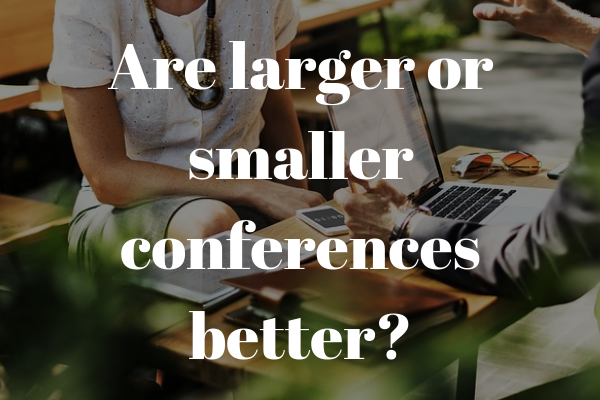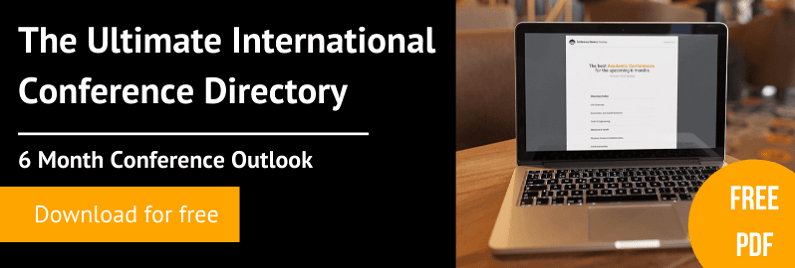
Are bigger or smaller conferences better?
Read a summary using the INOMICS AI tool
Conferences can range in size from less than fifty attendees to tens of thousands of attendees. But which is better to attend for your career: a larger or a smaller conference?
Download the Conference Monkey Directory - 6 Month Conference List

The repute of the keynote speakers
At larger conferences you are more likely to hear from famous names in your field; the big stars whose work everyone discusses. Sometimes, these big names really are wonderful speakers and hearing their keynotes can be inspiring and highly educational.
However, being a great researcher doesn't necessarily mean being a great speaker, so sometimes you'll find that keynote speakers can be dry and hard to listen to.
A larger conference also makes it less likely that you'll be able to talk one on one with the big names in attendance. At a conference with thousands of attendees, the biggest names will likely be very busy and you might only sight them across a crowded room. At a smaller conference, maybe there won't be so many big stars in attendance but you'll have a much better chance of actually interacting with them and having a chance to discuss issues in your field.
In either case, conferences will publish information about their keynote speakers ahead of time so you can check to see whether someone you really admire is attending.
The breadth of subjects covered
Bigger conferences tend to cover a wider range of subjects and topics, so you're more likely to be exposed to new concepts or methodologies that you haven't tried out before. Large conferences often have a number of key topics each year. This can be a great way to get new ideas for your project and to gain a better overall understanding of your field. However, this can be overwhelming if the conference is very large (as in more than 10,000 attendees) as it makes it difficult to find the specific people whose research interests are similar to yours.
At a smaller conference, the theme will likely be more focused. If you can find a small conference which focuses on the theme of your research, then great – you'll likely find many of the key people in your subfield in one location. But if your subject is specialist or esoteric then there may not be a dedicated conference for your topic, and you'll have to make do with a more loosely related theme.
Extra events like workshops and seminars
At a larger conference, you're much more likely to find extra events in addition to the conference days. Often, there will be one or two days of extra events like workshops or seminars before the conference proper begins. These workshops can be very helpful if you are a PhD student or if you need training in a particular area, such as a type of data analysis or a new research methodology. If you are a more senior researcher then you are less likely to need to attend these extra events, but you might enjoy them to brush up your skills.
Smaller conferences probably won't have extra events. There will only be the conference days themselves, and these are often shorter. A large conference may have up to five days of conference events plus two days of extras, while a smaller conference may only have two or three days of conference.
With a longer conference there is obviously more to see and do, but it can be hard to stay on top form for that long. Attending a conference can be draining, so be realistic about whether you'll be able to handle both a long conference and several days of extra workshops.
Likelihood of getting accepting to present
If you want to boost your career, then it's important not only to attend conferences but also to present at them. Giving a talk is most prestigious, but a poster presentation is good for your CV too. At a larger conference, there will be more slots for oral and poster presentations which works in your favour, but there may also be stiffer competition for those slots.
At a big conference the likelihood of you getting accepted to present is usually related to not only the quality of your research but also how well your project matches to the conference theme. You can have a truly excellent project but if it doesn't match this year's conference theme then you are not likely to be accepted.
At a smaller conference, you have a higher chance of being accepted to present. You can get the chance to give a talk as a PhD student or junior researcher which is much hard at a larger conference. If you're nervous about presenting, a smaller conference can be less intimidating as the audience will be smaller and the setting more intimate. On the other hand, while having a conference presentation on your CV is always good, a presentation given at a large and well known conference will look better.
Download the Conference Monkey Directory - 6 Month Conference List
Top Blog Posts to Read:
What's the difference between a conference, a seminar, a workshop and a symposium?
8 Benefits of Attending Conferences
What Should Women Wear to Academic Conferences?
What Should Men Wear To Academic Conferences?
A Guide to Asking Good Questions at Conferences
How To Improve Your Public Speaking
How to Get Accepted to an Academic Conference
-
- Konferenz
- (Hybrid)
- Posted 1 year ago
Sixteenth International Conference on The Constructed Environment, Universidad de Navarra, Pamplona, Spain
Between 14 May and 15 May in Pamplona, Spanien -
- Konferenz
- Posted 4 days ago
15th International Conference "Modern Building Materials, Structures and Techniques"
Between 12 May and 16 May in Vilnius, Litauen









